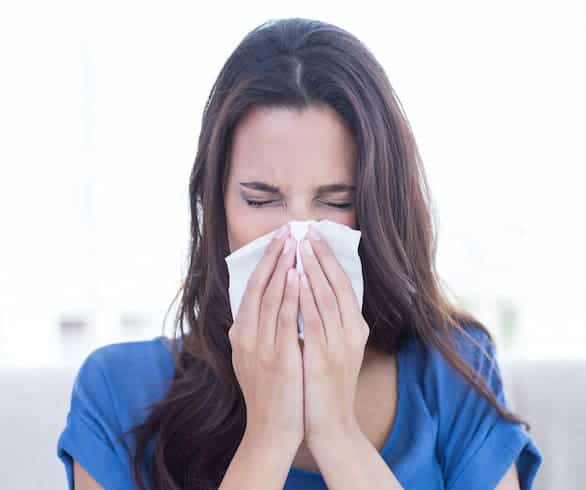
With the warm weather over, you may be feeling great— albeit dreading the snow—until you’re waiting in line for your coffee and the person in front of you turns and sneezes right in your face. Don’t be surprised: regardless of the weather, there are millions of bacteria, viruses, and parasites waiting to latch on and attack our healthy cells.
If the bacteria from that sneeze enter your system, your body’s first layer of defense—your skin—kicks into action. Should the infection get past this barrier, your body activates the adaptive immune system to rid itself of the bacteria.
When you get a cold or u, the symptoms are not a result of the infection: they are your immune system’s response to fighting it. For example, a fever means an increase in body temperature, which could deactivate a virus.
Over-the-counter medications can leave you feeling drowsy, or can interact with prescription medications you may be taking. There are several natural options that will have you guzzling your morning coffee as if nothing happened.
ELDERBERRY – USE AS DIRECTED
The elderberry plant has long been used as a strong ingredient in medicine, as it provides more antioxidant strength than other berry plants. However only the ripe berries and leaves of this plant are considered edible, while the stem is toxic.
Aside from also being made into wine and purposed as food flavouring, elderberry has been proven to boost the immune system. It can be used to remedy a number of illnesses such as influenza and swine u, protect against bacteria and infection, and slow down autoimmune diseases.
Elderberry’s extract, which is called Sambucol, is what pro- vides the high amounts of antioxidants. The antioxidants are also known as flavanoids, and they work to push our immune system into action. The elderberry’s long list of strong nutrients includes minerals like iron, potassium, phosphorous, and cop- per, as well as vitamins A, B, and C, proteins, and dietary fibre.
EVIDENCE
The Journal of International Medical Research published a study that indicates just how effective Sambacol can be when it comes to combating u symptoms. The study revealed that 93 per cent of u patients given Sambucol were symptom-free within two
days. It’s important to note that the study was conducted while an influenza B outbreak was taking place.
It wasn’t until researcher Erling Thom, with the University of Oslo in Norway, reported a recent study was it clear that it also works against type A u. His study found similar strong results using 60 patients suffering from the u. Within the group, half were given Sambucol and the other half a placebo four times a day for ve days. At the end of the study, 90 per cent of the participants found themselves entirely cured.
According to the University of Maryland Medical Center, the active compound in elderberry extract, known as Antivirin, is believed to be responsible for most of its effectiveness in the treatment of the u.
GINSENG – USE AS DIRECTED
Ginseng has a variety of heath bene ts, which is what earned the herb its popularity. Within this family of plants, each type offers different health benefits.
American and Asian ginseng both carry ginsenosides, which is the component that gives ginseng medicinal properties. The great part about ginseng is that it’s also an adaptogen, which means it helps your body to withstand mental and physical strain.
This herb has been included in the traditional Chinese medicine for many years due to its ability to prevent infection in the elderly. Ginseng’s strength lies in being able to work ahead of time to prevent colds before their symptoms develop.
EVIDENCE
A study published in the Canadian Medical Association Journal in 2005 found that extracts of North American ginseng enhance immune responses and stimulate natural killer cell cytotoxic- ity. This keeps the body healthy through peak illness periods. Those who were given the North American ginseng extract in a randomized test were able to overcome their colds a third more quickly, and their symptoms subsided dramatically.
“Our results can be compared with those for many of the common antiviral drugs for the treatment of influenza. The standard extract of North American ginseng was effective in reducing the absolute risk of recurrent colds and the mean number of colds per person,” says the Canadian Medical Association.








